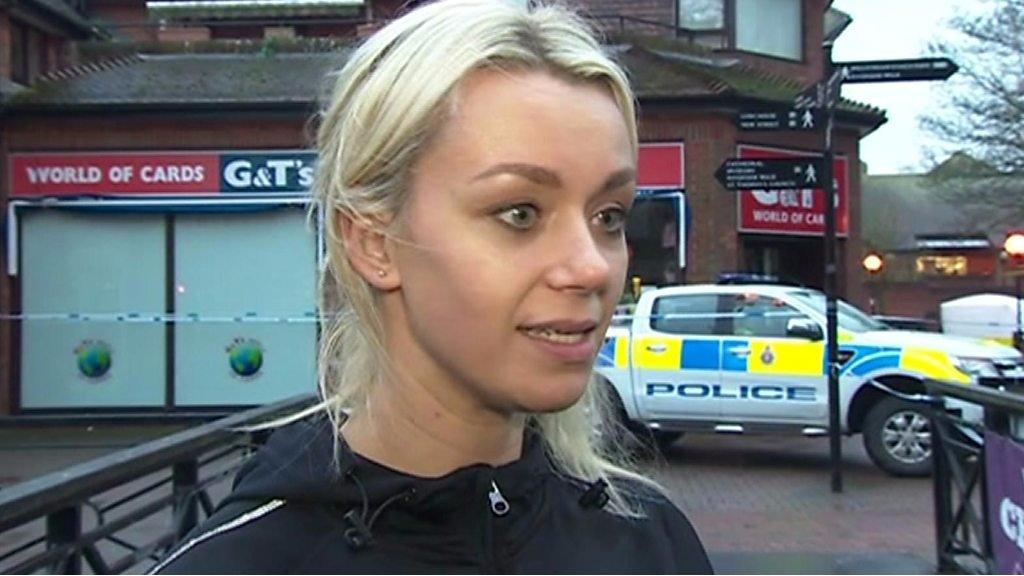Sergei Skripal and the 14 deaths under scrutiny
- Published
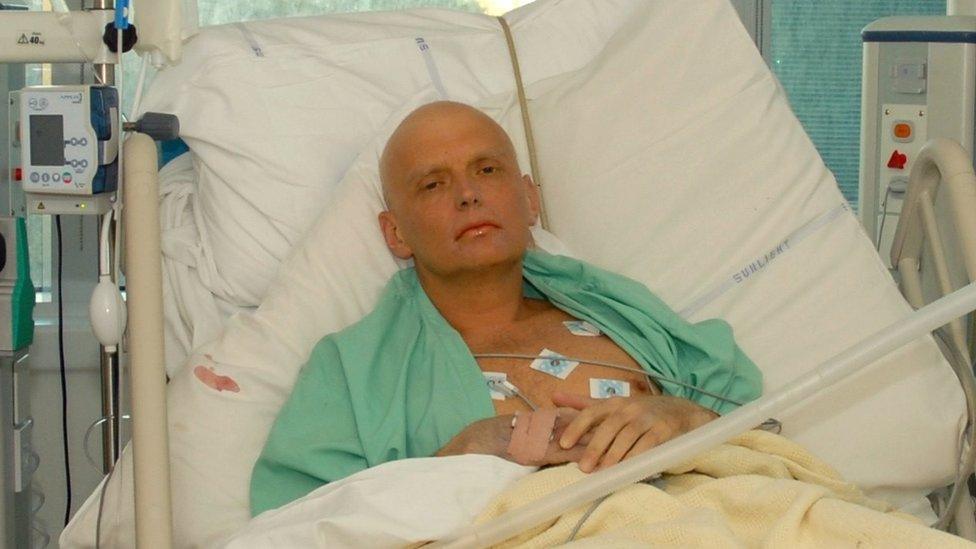
Alexander Litvinenko lies in a hospital bed in London, shortly before his death in 2006
When Sergei Skripal, a former Russian double agent, collapsed suddenly on Sunday in the sleepy cathedral city of Salisbury, there were unavoidable echoes of a messy, high-profile death in London a little over a decade before.
In 2006, Alexander Litvinenko, another former Russian agent, was rushed to hospital after collapsing in London. As the world watched, a rare and highly radioactive isotope destroyed Litvinenko's organs one by one, and he died three weeks later.
A British public inquiry found that the former Russian agent had ingested Polonium 210, and that his assassination was likely ordered directly by Russian President Vladimir Putin.
Mr Skripal, 66, who was imprisoned in Russia for working for British intelligence and later came to the UK as part of a spy swap, is currently in critical condition, along with his 33-year-old daughter who was also taken ill. Authorities say they are trying to determine if he was poisoned.
Russia has denied any involvement, but the case has put renewed scrutiny on a string of deaths in the UK in the past two decades. The chair of the home affairs select committee, Yvette Cooper MP, wrote to Home Secretary Amber Rudd on Tuesday, external calling for a review of 14 other cases.
Those cases were variously found to have been heart attacks, suicides, accidents, and deaths by natural causes, but some allege that they amount to a pattern of state-sponsored murder on British streets.
Heartbreak grass
Security guard Neil St Clair-Ford was driving through Weybridge in Surrey in November 2012 when he saw something lying in the road ahead of him. He pulled over and found Alexander Perepilichnyy, an exiled Russian banker, in the foetal position, pale, cold, and displaying "very faint" signs of life.
Mr St Clair-Ford called a local former Navy colleague, Liam Walsh, to help administer first aid. Mr Walsh told an inquest that Perepilichnyy vomited "greeny-yellow" bile during mouth-to-mouth resuscitation with a strange taste, like "licking a battery".
Perepilichnyy was born in Ukraine and made his fortune as a financier in Russia, allegedly helping government-connected Russians launder money. In 2010 he fled to Britain and began to co-operate with British authorities. He collapsed during a run near his home, the day he returned from a short trip to Paris.
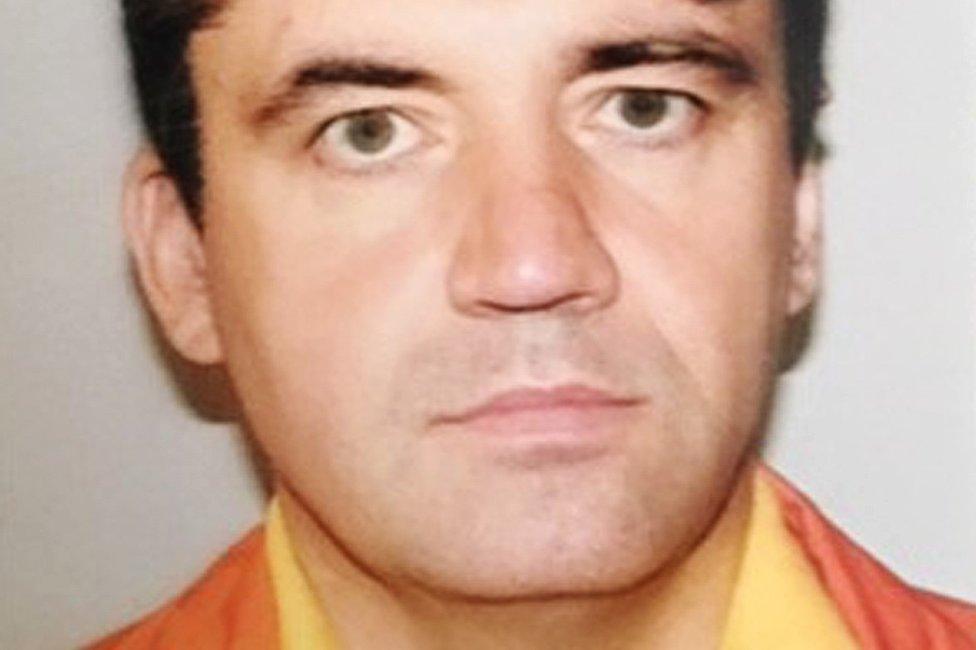
An expert botanist said tests suggested the presence of a rare plant toxin in Perepilichnyy's stomach
Initial toxicology tests on Perepilichnyy's body revealed nothing suspicious and police said they had no evidence of foul play. But later tests performed by an expert botanist at Kew Gardens suggested the presence of a rare and deadly plant toxin in Perepilichnyy's stomach.
Gelsemium, a flowering plant native to China and South East Asia, is known as "heartbreak grass", because its leaves, if swallowed, cause cardiac arrest. Further tests of the compound found in Perepilichnyy could not definitively identify it as gelsemium, and an inquest into his death was suspended last year pending yet more tests. The inquest resumes next month.
US intelligence sources told the BBC in 2016 that they believed Perepilichnyy was murdered. An extensive investigation by Buzzfeed News, external claimed that the businessman was one of at least 14 deaths in the UK that US officials suspected were connected to Russia.
'The highest level of risk'
The following year, 2013, Boris Berezovsky, a one-time oligarch and close friend of Vladimir Putin, was found hanged in his bathroom. All the evidence seemed to point to a suicide. He had been suffering from depression and was in debt. According to police there was no sign of a struggle. A Home Office pathologist concluded that his injuries were consistent with hanging.
But he had also made himself a sworn enemy of Mr Putin, having fled Russia for exile in Britain and fiercely criticised the regime from afar.
Berezovsky's family arranged for an asphyxiation expert to examine photographs of his body. Dr Bernd Brinkmann testified that the ligature mark on Berezovsky's neck did not share the typical V-shape created by a hanging, and instead suggested strangling. The dead man also had a broken rib and a cut on the back of his head. It was enough to persuade the coroner to record an open verdict.
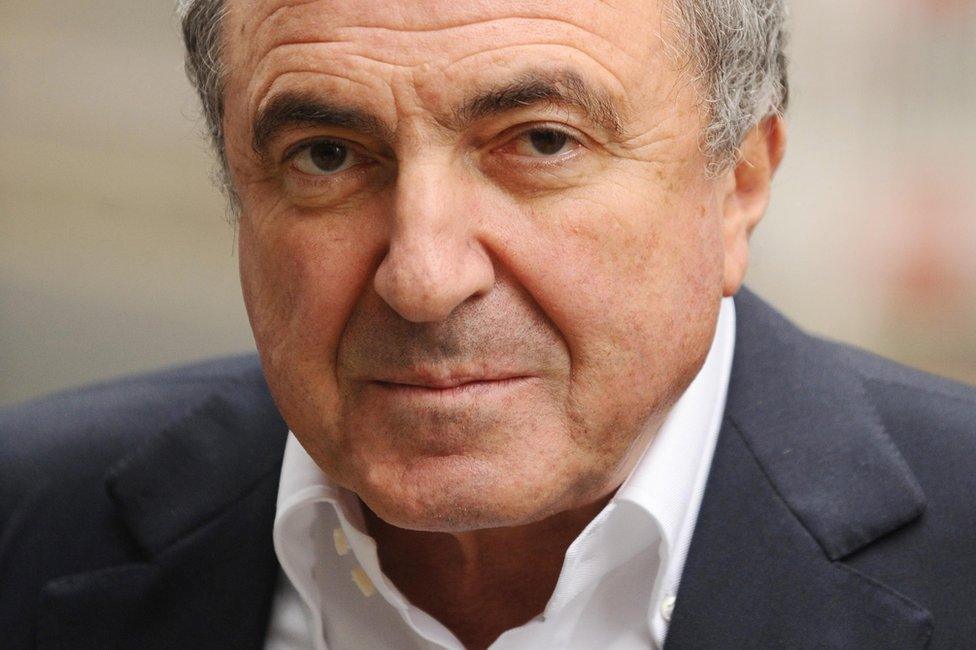
Boris Berezovsky was found hanged in a bathroom at home in 2013
"Anyone Putin deems to have betrayed Russia is at the highest level of risk," said Bill Browder, a former Moscow-based financier who led a campaign to impose sanctions on top Russian officials accused of corruption - sanctions that enraged Mr Putin.
"And Russia can get away with brazenness in the UK because there have never been any consequences to Russian assassinations here," he said. "The British government either ignores the crimes completely, as they did in the Perepilichnyy case, or they recognise the crime and don't do anything about it."
Speaking in parliament on Tuesday, UK Foreign Secretary Boris Johnson said any evidence of Russian involvement with Mr Skripal's condition would be dealt with "appropriately and robustly".
"I say to governments around the world that no attempt to take innocent life on UK soil will go unsanctioned or unpunished," he said.


Among the other deaths flagged to the home secretary on Tuesday are those of Gareth Williams, the so-called "spy in the bag", whose badly decomposed body was found locked inside a holdall in his bath; Dr Matthew Puncher, a British scientist involved in the Litvinenko case who was found in his kitchen with multiple stab wounds from two separate knives; and Scot Young, a business associate of Berezovsky, who was found impaled on railings outside his London flat after falling from a fourth-floor window.
Williams' death was ruled to be "probably an accident" and Puncher's and Young's both suicides, and British police say they have found no evidence of Russian involvement in any of the cases barring Litvinenko's.
"British police are under no sort of political pressure whatsoever," Tony Brenton, the British ambassador to Moscow at the time of Litvinenko's death, told the BBC. "If they had found evidence of Russian involvement in those cases, we would have followed it up."
But the UK government has faced criticism over a perceived lack of action. In the wake of Litvinenko's death, the UK tried and failed to extradite two Russian agents alleged to have carried out the hit. Instead, several Russian diplomats were expelled, provoking a tit for tat response from Russia.
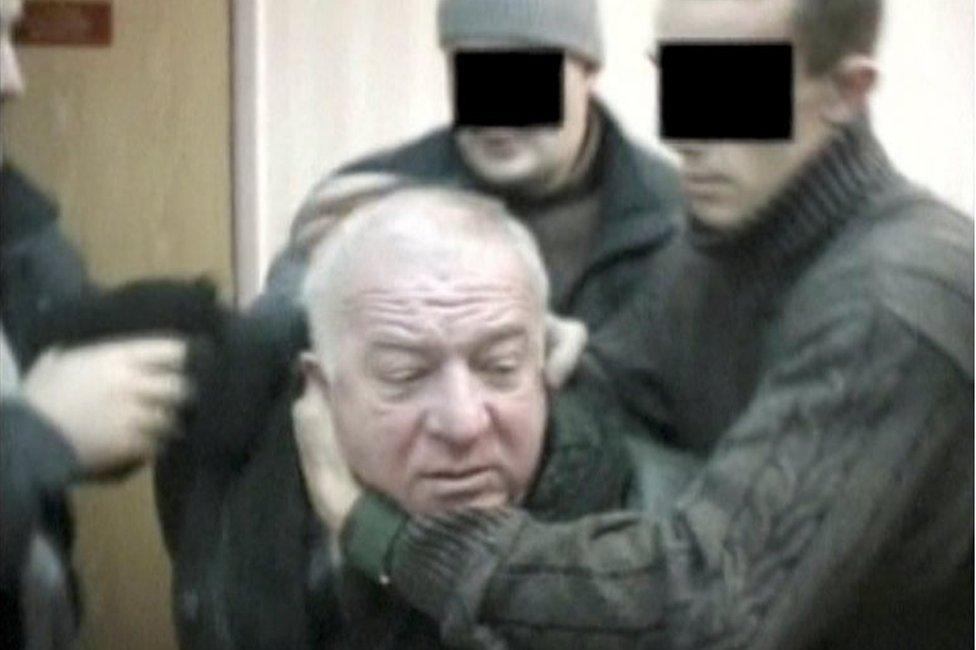
A video still shows Sergei Skripal being detained by Russian security services in 2004
The problem facing the UK government now, said Mr Brenton, is that ministers have already levied significant sanctions on Russia over its actions in Ukraine and Syria, and diplomatic relations are already very poor.
"If it is proven that this was an attack with Russian state involvement we will of course do something, there will be lots of anger and probably more sanctions. But we have already used up an awful lot of our ammunition. The locker is quite bare," he said.
In a statement, the Russian embassy in London said: "Media reports create an impression of a planned operation by the Russian special services, which is completely untrue."
In Salisbury, counter-terror police have taken over the investigation. The park bench where Mr Skripal collapsed has been cordoned off and a restaurant where he ate lunch has been temporarily closed.
If it turns out to have been a Russian attack, part of the purpose will have been to warn those in Russia against betrayal, and those in exile that they are never safe, said Mr Browder. "It sends a message to the rank and file that terrible things can befall you and your family," he said.
- Published6 March 2018
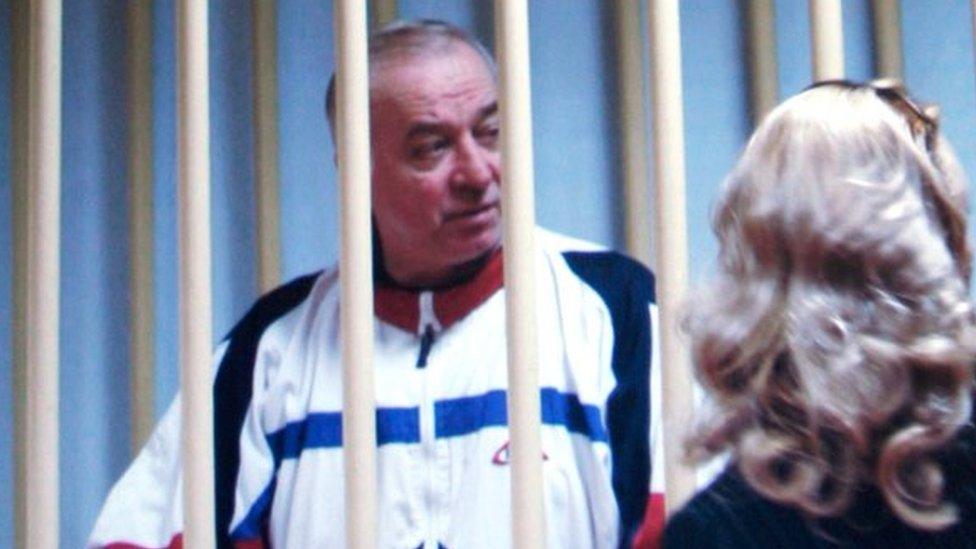
- Published3 February 2018
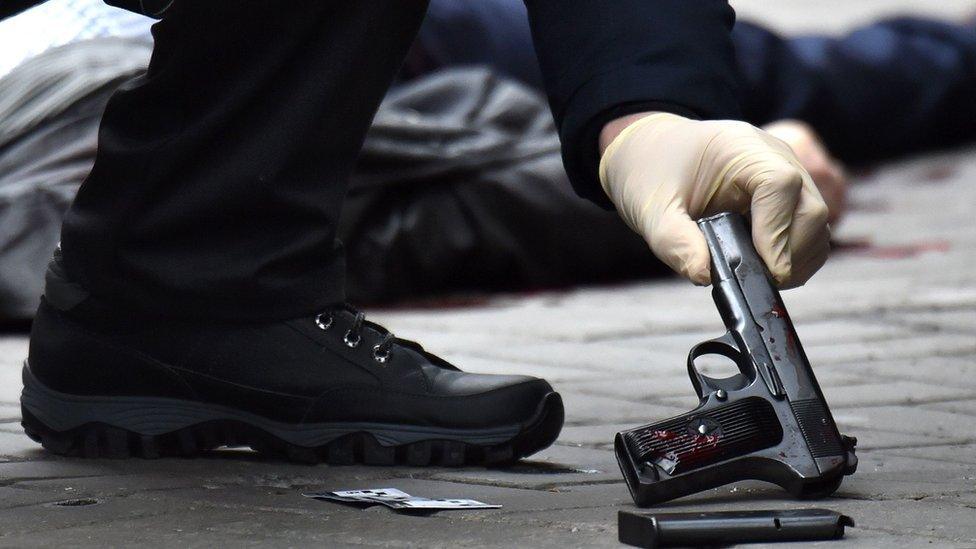
- Published29 March 2018
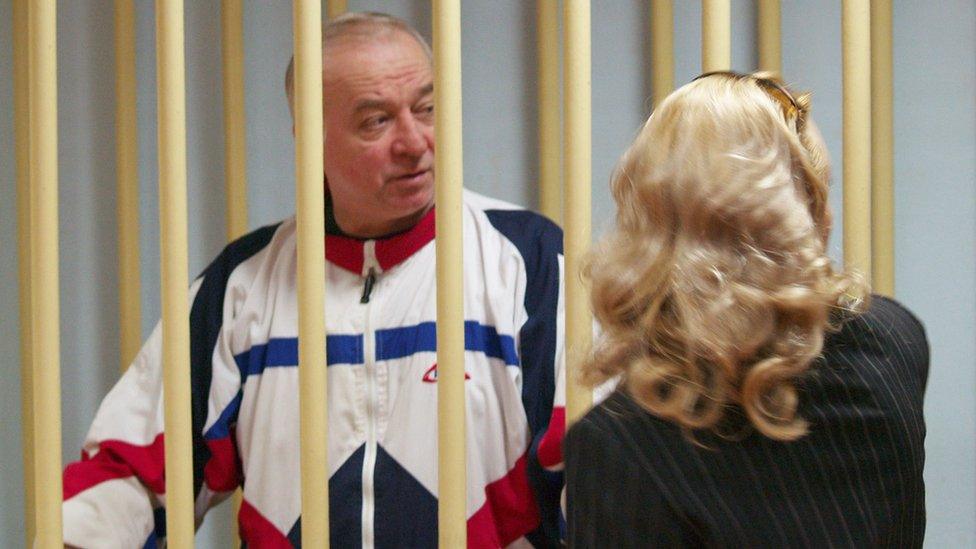
- Published5 March 2018
